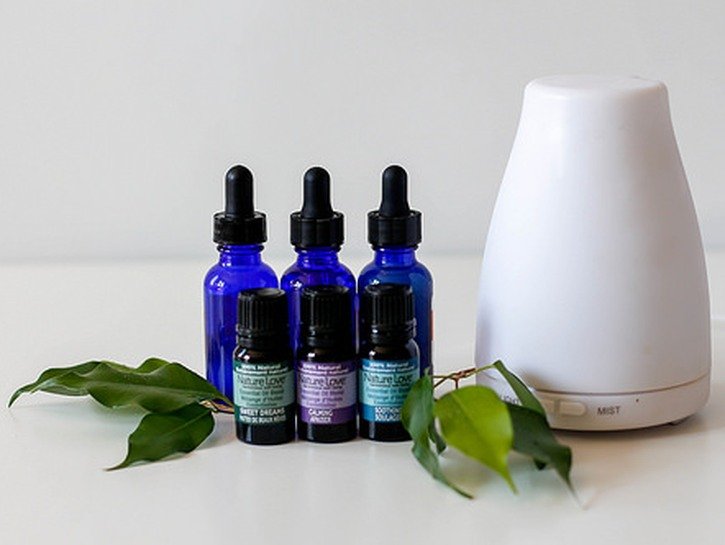What is aromatherapy?
Aromatherapy is an alternative medicine practice in which the fragrance of various plants are distilled into essential oils and inhaled or applied to skin.
Plants contain natural chemicals they use to defend themselves from insects, rodents, viruses, and threatening bacteria. These get extracted from the plant and are distilled and mixed with alcohol to increase the strength and staying power of the scent. Often, a “carrier oil” like almond, jojoba, or coconut oil is mixed with essential oils before being applied to skin.
Aromatherapy refers to a few different methods, including diffusing scents into the air, inhaling scents directly from a bottle or saturated material, bathing in fragrant oils, or rubbing oil directly onto one’s own skin or via a massage therapist.

colors/Shutterstock
What are the benefits?
Aromatherapy has been used to treat and alleviate the symptoms of both short and long-term health disorders, such as depression, anxiety, insomnia, chronic stress, muscle and joint pain, respiratory infections, digestive issues, PMS and menopausal symptoms, fatigue, and even cancer symptoms.
Some essential oils have also been shown to kill germs. Bergamot and eucalyptus vapors killed the flu virus in 10 minutes, while cinnamon, lemongrass, lavender, and geranium did it in 30.

Draw05/Shutterstock
How does it work?
Studies on both humans and animals have demonstrated that aromatherapy oils can have sedative and positive stimulant effects, as well as benefits for the immune system and central nervous system. There’s also evidence that aromatherapy improves mood, as recent images of the brain have shown that a part called the limbic system, which helps regulate emotional responses, reacts positively to the inhalation of fragrant oils.
There are several different methods one could use to benefit from aromatherapy. It all depends on what you personally feel most comfortable with and what fits best into your routine. It should also be noted that best results are recorded when pure, therapeutic-grade essential oils are used instead of ones with synthetic components.
Diffusers
A popular industry right now, essential oil diffusers work like tiny humidifiers that add scent into the air. The tank breaks down the oils into micro-particles which permeate the air in a fine mist. After the oil is distributed in the air, the particles linger for hours.
Massage Therapy
Technically a Swedish massage, an aromatherapy masseuse uses fragrant oil or lotion containing essential oils to massage their client, at which point the oil scents are inhaled and the molecules are absorbed through the skin. Different scents are said to promote different results, so while chamomile, lavender, or geranium oil are used for relaxation, rosemary oil is used for energizing. Massage therapy is currently being used to treat the symptoms of conditions like anxiety, depression, insomnia, dementia, and menstrual pain.
Bathing in Essential Oil
There are a few ways to add oils to your bath to maximize benefits. Adding oil directly into your bath water is not always ideal, since water and oil aren’t known to mix particularly well. Instead, add 5 drops of essential oil to your shower gel or bath salts. If you feel that you absolutely must add essential oil directly to the water, try mixing it with a carrier oil like almond, jojoba, or coconut oil.
Inhaling or Applying Directly
The cheapest and most direct way to benefit from essential oils is to rub them directly on your skin or inhale their fragrance straight from the bottle. It’s worth noting that if you’re going to apply essential oils topically, you should read the label for classifications like “neat”, “dilute”, or “sensitive”. Mild essential oils are labeled “neat”, and can be applied straight to the skin, while “dilute” is meant to be diluted by a carrier oil and “sensitive” should be diluted when applied to young or sensitive skin. Apply oils on the neck, forehead, and temples to destress and release tension.

Poznyakov/Shutterstock
Brief History
Dating back thousands of years, aromatherapy was first recorded in human history around 3500 BC. Egyptians were famous for their use of infused oils for use in rituals, medicine, cosmetics, and perfumes.
Eventually, Persian physician Avicenna (980 – 1037) would invent a refrigerated coil to distill the essential oils of plants, and later German physician Hieronymus Brunschwig (1450 – 1512) would write several books on essential oil distillation.
In 1910, French chemist René-Maurice Gattefossé (1881 – 1950) recognized the potential of lavender’s healing properties after severely burning himself in a lab accident. He would go on to use essential oils to treat wounded soldiers in military hospitals in World War 1. In 1937, Gattefosse wrote a book about aromatherapy and coined the term.
